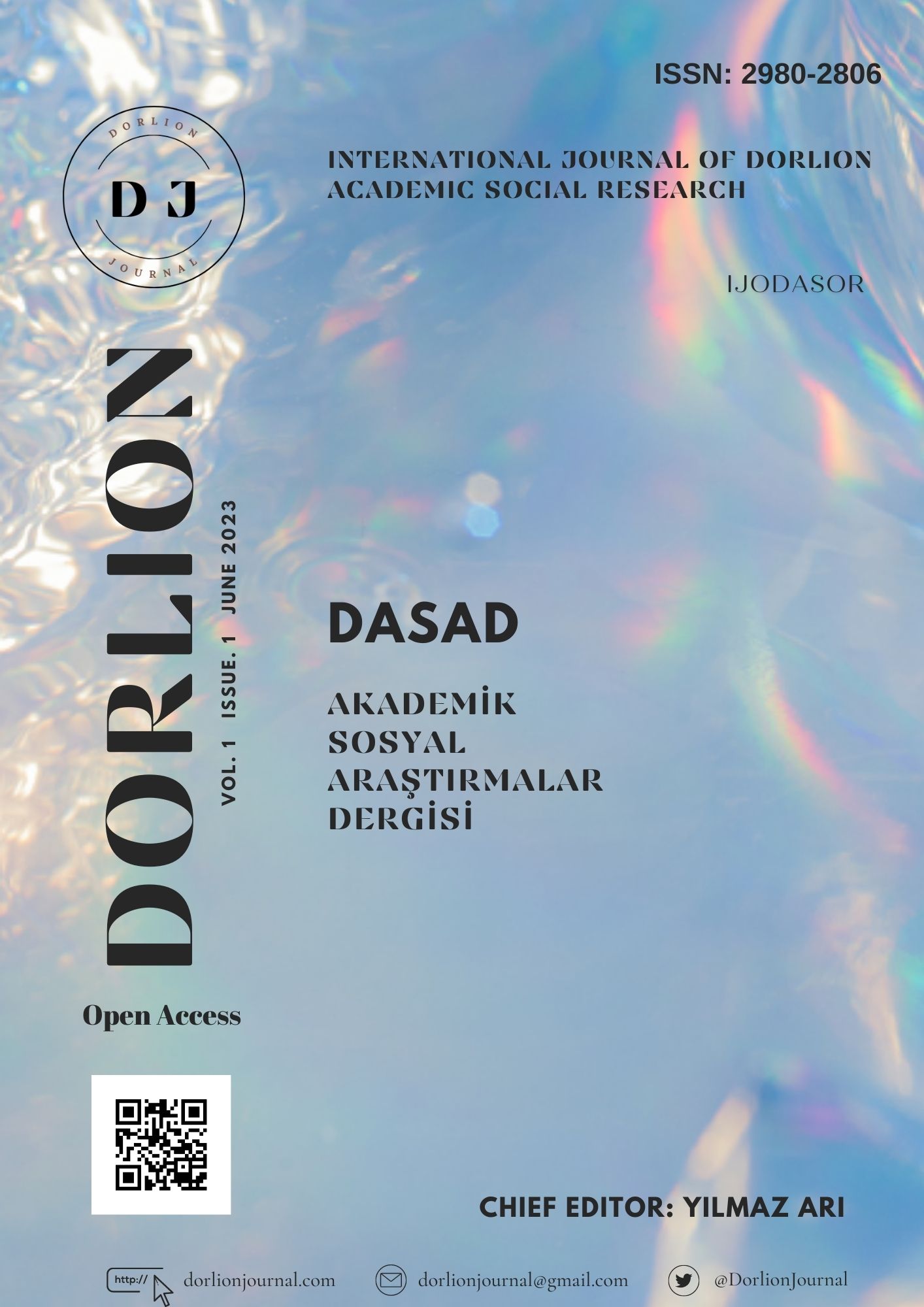The Transcendent Form of Choice Being Off Target for the Present and Future: A Sacred Tradition Perspective
DOI:
https://doi.org/10.5281/zenodo.8057481Keywords:
Sacred, Tradition, Reason, Islam, KalamAbstract
It is always necessary to act on a principled stance in recognizing the past and even sacred processes of experience. Otherwise, the will to turn yesterday into a sacred form instead of evaluating it will come to the fore. In fact, while trying to understand it quite closely, it is seen that some of the stages presented to us touch different syndromes. Accordingly, it can be easily said that what has happened and what should happen, as far as is known, emphasizes attitudes rather than principles. Nevertheless, the preference for presenting some of the historical experiences and even preferences as a form of holiness that is lived, which is quite meaningless, even quite unhelpful, seems to be a very divisive and even unnecessary, even meaningless phenomenon in the context of these processes. Accordingly, the fact that the tradition of the period of the formation of Islam or Islamism is put into historical accumulation through the processes of war and conflict as the will to narrate from the very beginning, in fact, the will to narrate through the preference or even necessity of 'holding human beings to account' or 'destroying' rather than the 'human upbringing
order', which is the raison d'être of the tradition, comes to the fore. Rather than contributing to the phenomenon of religion, this preference leads to understanding it as a necessary apparatus of human formations, which shows that this stage that has been reached and preferred shows that the phenomenon of religion is handled not in principle, but in the process of lived phenomena. The fact that this step is a human preference explains that what is necessary in the world of human beings does not provide the opportunity for it to come to life in every situation as much as it is a phenomenon that can be experienced in every situation. The most valuable example left to us by historical accumulation is that when trying to understand yesterday, it is necessary to consider it based on lived experience due to the temporal, historical and geographical stance of human beings, not on the sacred form that is memorized and imposed. It should be kept in mind that this tendency is both a positive source and a possible circle of safety left by the lived experience for the person who evaluates the day. On the contrary, what is emphasized in the segment of the occurrence of situations is the option that it is the form of life and quality that is strictly limited to yesterday. Moreover, it is a long-experienced evaluation scale that the mentioned approach, even if not from its own point of view, offers an opportunity for a negative will tendency that sanctifies yesterday rather than living the day after the course of skipping the future at every step it deals with.
References
REFERENCES / KAYNAKÇA
Akın, Hüseyin Bana Öğretmenini Söyle. İstanbul: Şule Yayınları, 2. Baskı, 2019.
Aksu, Mehdi. İslâm Tarihinde Gerçeğe Giden Yol. İstanbul: İstanbul Matbaa/Mücellit, 2003.
Belaslatinas, Perfectus. Kurbağa Manastırı/Abbatia Ranae, çev. Kemal Gözler. İstanbul: Kırmızı Kedi Yayınları, 2021.
Câmî, Mevlânâ Abdurrahman. Peygamberlik Müjdeleri/Şevâhidü’n-Nübüvve, İstanbul: Bedir Yayınları, 1976.
De Blij, Harm. Coğrafya Neden Önemlidir/Hiç Olmadığı Kadar, çev. Fatma Yavaş - Baki Kaya. Ankara: Hece Yayınları, 2019.
Derveze, İzzet. Kur’anü’l-Mecid/Kur’an’ı Anlamada Bir Yöntem Çalışması, çev. Vahdettin İnce. İstanbul: Ekin Yayınları, 1997.
Eaton, Gai. Kalenin Kralı/Modern Dünyada İnsanın Tercih ve Sorumluluğu, çev. Birol Çetinkaya. İstanbul: İz Yayıncılık, 2000.
Ferngren, Gary B. (edt.), Batı Geleneğinde Bilim ve Din Tarihi. İstanbul: Say Yayınları, 2016.
Güngör, Fethi. Muttaki Mütefekkir Cevdet Said. İstanbul: Çıra Genç Yayınları, 2019.
Gürkan, Emrah Safa. Bunu Herkes Bilir/Tarihteki Yanlış Sorulara Doğru Cevaplar. İstanbul: Kronik Yayınları, 5. Baskı, 2020.
Han, Fethullah. Kur’ân ve Kâinat Ayetleri/Allah, Kâinat ve İnsan, çev. Safiye Gülen - Oya Morçay. İstanbul: İnkılâb Yayınları, 1998.
İsfahanî, Râgıb. Mutluluğun Kazanılması/Tafsilü’n-Neşeteyn ve Tahsilü’s-Saadeteyn, çev. Mustafa Solmaz. İstanbul: Sufi Yayınları, 3. Baskı, 2020.
Kılıç, Emrullah. Ahlak ve Medeniyet/Ralph Barton Perry’nin Ahlaki Medeniyet Teorisi. Ankara: Elis Yayınları, 2022.
Le Gall, André. Anksiyete ve Kaygı/L’anxiété et l’angoisse, çev. İsmail Yerguz. Ankara: Dost Yayınları, 2006.
Mcintyre, Lee. Hakikat Sonrası, çev. Mehmet Fahrettin Biçici. İstanbul: Tellekt Yayınları, 2019.
Mezghani, Ali. Tamamlanmamış Devlet/Arap Ülkelerinde Hukuk Sorunu, çev. Ahmet Arslan. İstanbul: İstanbul Bilgi Üniversitesi Yayınları, 2015.
Okumuş, Namık Kemal. Dogmatik Uyku/Din, Bilim ve Tanrı Zihniyetinin Kökenlerine Dair. Ankara: Araştırma Yayınları, 2021.
Okumuş, Namık Kemal. Dost Ateşinde Pişmek/Te’vil ve Tefsir Arasında Müslüman Zihin. Ankara: Araştırma Yayınları, 2019.
Okumuş, Namık Kemal. Ömer Müslümanlığı/Yaşayan Dindarlığın İlke, Adalet ve Ahlâk Bazlı Analizi. Ankara: Araştırma Yayınları, 2023.
Özkan, Ercüment. Dünden Yarına Dünya. Ankara: Anlam Yayınları, 2005.
Özkan, Ercüment. Dünden Yarına Türkiye. Ankara: Anlam Yayınları, 2005.
Songür, Hasan. Allah Rızası A. Ş./Korsan Tarikat, Korsan Şeyh. Ankara: Hitabevi Yayınları, 2021.
Storr, Anthony. Sahte Peygamberler Yalan Cemaatler/Bazıları Deli Ama Hepsi Aynı, çev. Aslı Day. İstanbul: Okuyan Us Yayınları, 2020.
Türker, Ömer. Anlamı Tamamlamak/İslam Düşünce Geleneğinin Anadolu Coğrafyasındaki Bileşenleri. İstanbul: Ketebe Yayınları, 2020.

Downloads
Published
How to Cite
Issue
Section
License
Copyright (c) 2023 Namık Kemal Okumuş

This work is licensed under a Creative Commons Attribution-NonCommercial 4.0 International License.




